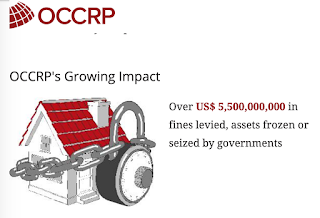Between fines and recovered funds, journalists get results
Lately a couple of us here at the University of Navarra have been looking for models of high-quality journalism that are sustainable. As it turns out, many of the best news organizations that are thriving are doing investigative journalism.Readers like this type of journalism, which holds the powerful accountable for their actions, makes them responsible for serving the public rather than themselves.
In a 2016 article, two leaders of global investigative journalism organizations made the case that investigative journalism actually has a great return on investment, ROI.
Versión en español
"Over the years [Organized Crime and Corruption Reporting Project (OCCRP)] has accepted $5 million in funding from the U.S. and other governments. The return on that funding? With $2.8 billion recovered in fines and seized assets by various governments, the payoff is over 56,000 percent (or a 560-fold return)".
The authors of that article were David E. Kaplan, executive director of the Global Investigative Journalism Network, and Drew Sullivan, one of the founders of OCCRP.
OCCRP epitomizes a new model for quality journalism in the digital age --collaborative investigative journalism that spreads the costs and spreads the risks among many journalists and news organizations.
OCCRP was launched in 2006 by Paul Radu in Romania and Sullivan in Bosnia-Herzegovina with a focus on exposing corruption in Central and Eastern Europe. “Because police do not cross borders, journalism is the only natural global enemy of corruption,” according to the group’s website.
Impact
The organization’s annual report is filled with examples of impact of specific stories and offers this summary information from its members’ work:
- More than 20 major sackings, including a president, a prime minister, and CEOs of major international corporations
- Nearly $5 billion [with a B] in assets frozen or seized by governments
- 1,400 company closures, indictments, and court decisions
- 100 criminal investigations and government inquiries launched as a result of its investigations
OCCRP's “Russian Laundromat” investigation exposed “an immense financial fraud scheme” that allowed Russian oligarchs and business people to move $20 billion in illicit funds out of Russia to European and Western banks.
But investigative journalism takes time and money, and it has often been the first victim of budget cuts by media that have seen their advertising revenues plummet in recent years. In addition to being expensive, investigative reporting is risky. It exposes corruption, which often results in attempts by the powerful to silence the journalists and their organizations, even to the point of violence and murder.
Investigative journalism organizations like OCCRP spread the cost and the risk. An exposé like the Panama Papers, in which OCCRP was a key player, published simultaneously in dozens of different countries and media, cannot be suppressed or ignored.
Investigative journalism community grows
Kaplan told me in an email (May 2019) that in general, media development represents just a tiny fraction of international assistance funding -- just 0.3 percent of total official development assistance (ODA) from 2010-15 (about $500m/year from all donors).
However, support for investigative journalism has grown. "OCCRP has gone from $500,000 to $7 million.
ICIJ [the International Consortium of Investigative Journalists, which organized the Panama Papers investigation], jumped from about $1.6 million to also around $7 million. GIJN
itself grew from $30,000 in startup funds to $1.7 million today, and its
membership has tripled over the past seven years to 177 member groups
in 76 countries," Kaplan told me.
Kaplan estimates that investigative journalism aid has at least tripled in the past half-dozen years. "I attribute this to various factors in
recent years -- the Panama Papers, the Spotlight movie [the Boston Globe's investigation of pederastic priests], Brexit,
Trumpism, the onslaught of disinformation online, as well as the
convincing case GIJN and its members have made for funding IJ because of
the extraordinary ROI it has (through fines, recovered taxes, seizures,
etc.)".
Related:
In Eastern Europe, a media battle for hearts and minds
Smart money is betting on local, trustworthy news

No comments:
Post a Comment